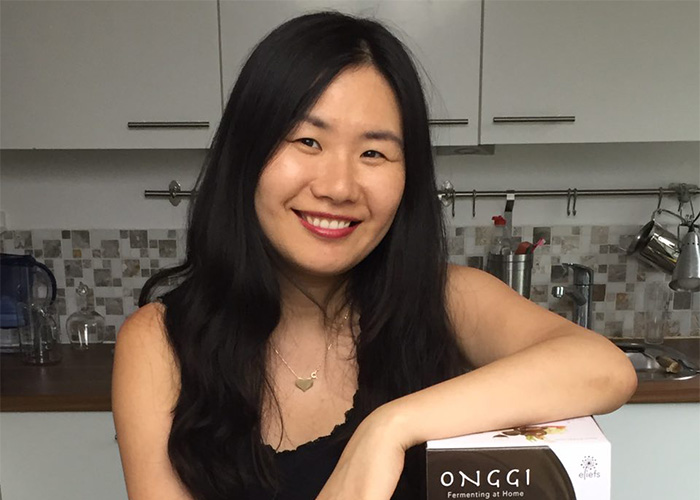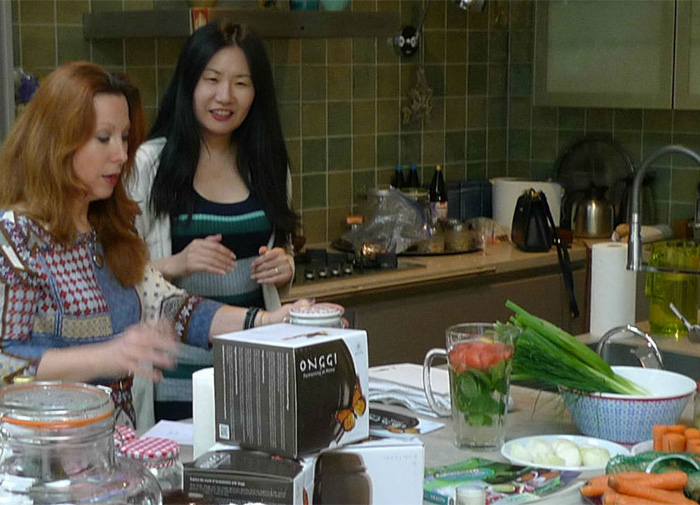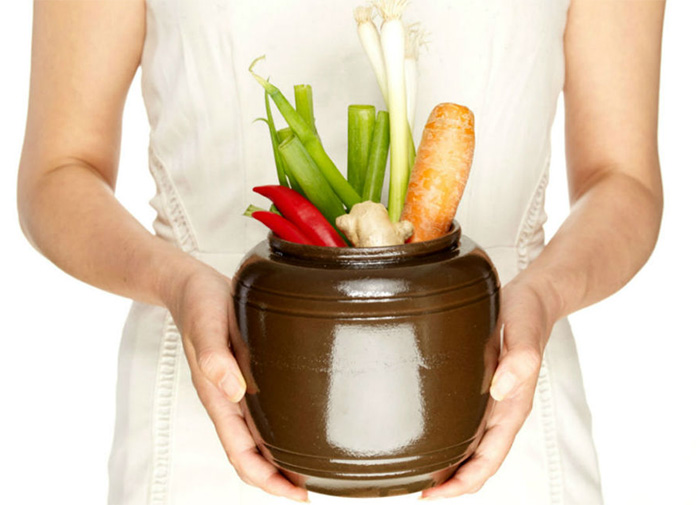View this article in another language
- 한국어
- English
- 日本語
- 中文
- العربية
- Español
- Français
- Deutsch
- Pусский
- Tiếng Việt
- Indonesian
Today we introduce our readers to Eliefs, a great project started in the Netherlands aiming to bring beautiful and eco-friendly, sustainable products based on Asian philosophies and cultures to Western markets, inspired by the Korean traditional process of fermentation using onggi (옹기) earthenware vessels.
We had a chat with Yoonseon, one of the two minds behind Eliefs.
Could you tell us a bit about yourself? How did the idea of introducing onggi come to mind?
I am Korean and have been living in the Netherlands for several years. I did my MBA in Rotterdam, the Netherlands. I worked for management teams at an international financial company for years and I very much enjoyed that. However, starting a business on your own lets you create something new. It gives you a chance to make a contribution and to participate in something bigger.
I should say it was a natural choice to bring onggi to the West. I am always interested in exploring something new, and, of course, traveling and food are one of the best things. During my MBA course, I took an entrepreneurial class and for the first time thought of running my own business someday in the future. When the time came, I was naturally looking for something unique and special from Korea. I knew that Asia and particularly Korea has a lot to offer Westerners.
Many Koreans overlook their own heritage and have been doing so for a long time, and are very focused on Western ways of life, forgetting their own traditions. However, we started realizing the value of our own traditions and our large onggi clay jars are one of them. They're based on technology that doesn’t exist anywhere else. They're healthier and environmentally friendlier than any other types of clay jars, and are based on thousands of years of heritage. Nowadays, they're almost forgotten due to modern glass and plastics. However, onggi clay jars are back as part of our daily life in Korea. Both young and old have started using onggi jars again for fermenting or for storage. Everything fermented in an onggi vessel is considered premium in the market.
We believe that in order to make Asian and particularly traditional Korean products successful in Western markets, we have to create our very own brand and identity. That’s because we're convinced that the product brings genuine added value to the customer. Also, we have to find the right language for our Western audience. Finally, we need to manage our own brand with a nice website, a social media presence, and an expert community sharing its knowhow about how to use onggi clay jars for fermenting.
As a startup, it's rather unusual today to create a business with a tangible product, with all the hassles that brings with it: high initial investment, logistics, transport costs, et cetera. On the other hand, a society cannot survive on the service industry alone. I thought that onggi clay jars could be a great way to start my own business as an Asian living in Europe. Furthermore, my fiancé, a German scientist working in the Netherlands, is sharing lots of valuable input with me as a Westerner, and helping a lot to stay inspired and on the right track to realize my fusion of East and West and my green business idea.
We're a business, and not a mission. What excites us is the goal of bringing together the spirit of the original idea: meaning, to bring together both Asian balance and Western creativity.

What Korean food from back home do you miss the most? What do you think of the Korean food you can find in Europe?
Sometimes, I'm confused about what I really miss: the Korean food or the Korean atmosphere. Maybe it's the atmosphere of sharing love by sharing food. What I dearly miss from time to time is Korean barbecue with friends or colleagues, or home cooked meals with family and relatives. That atmosphere can’t be copied. Also, somehow the taste is never the same. The same homemade food here, based on the same ingredients and the same recipe, often tastes different. There's something deep that only a Korean can recognize that we call sonmat, literally, the “cook’s special touch.”
It's not difficult to find Korean food in Europe. Every big city has at least one or several Korean restaurants and grocery shops. I can make my own kimchi, marinades and other items, and from time to time I can go out for dinner at a Korean restaurant that offers more or less similar quality food as in Korea.
However, what I think we miss here in Europe is the diversity of Korean food, in terms of quality and quantity, and this may be because of the scale issue. In Korea, we have a wider choice of ingredients. For example, in Korea we can use Korean organic chili pepper flakes and rice powder rather than ingredients from China. When we make kimchi, Korean people select the ingredients very carefully, especially the cabbage and the red chili pepper flakes because those two are essential to making a good kimchi. I looked for decent quality ingredients in Holland, but only average quality ingredients were on sale. Likewise, in Korea we have lots of specialized restaurants with specialized Korean menus with different dishes and different atmospheres. From the high end for special occasions and business meetings to fast food for students or lunch: Korea has it all. However, that's not here yet in Europe, in terms of Korean food choices. As Korean food is growing in popularity, I hope we'll be able to see more kinds of Korean restaurants across Europe sometime soon.
Fermented food is gaining popularity in the West, and Korean food has also become more well-known over the past few years. Do you think promoting Korean cuisine as a healthy diet would be key for it to spread even further?
Indeed, fermented food is a hot topic in food and nutrition nowadays. Many studies have shown that fermented food offers greater health benefits by improving the health of our gut, which is essential to good health. The interesting thing is that fermentation is an essential part of Korean cuisine. It is balanced and harmonious in terms of taste and nutrition, and I think it's not a coincidence that unique and special vessels, like onggi clay jars, were developed in Korea.
The idea of balance, particularly from Zen teachings, starts with food and particularly with non-processed food. That's why I think traditional Asian ways of thinking, particularly Buddhism, in terms of balance, could give the right impulses to Western cultures today. Why not start again with the individual? Western food is highly sophisticated as well, but in some aspects traditionally quite unhealthy and over-processed.
Asian attitudes toward nature are very different from Western attitudes toward nature. Nature is not something we should fight or govern, but something that lives together with us in harmony. In Asia, there are thousands of years of continuity. Maybe borders have shifted, but never the way of life. This philosophy is deeply embedded in Korean food, too.
You know, Hippocrates once said, “Let food be thy medicine and medicine be thy food." Can you believe that that is exactly the basic belief toward food in Korea? When we are ill, we heal our body with food. Food and medicine have the same purpose. That’s why -- unofficially -- there are lots of people who believe their serious illness, such as cancer, say, was cured by eating fermented foods prepared in onggi clay jars. That secret has been revealed in many studies.
As far as I know, Korean food is already quite well known as being healthy and is often considered to be the "next big thing" in food trends. More and more people are getting health conscious and interested in a healthy life style. Korean food, based on balance and harmony, will naturally attract more people. There's no doubt.

What do you find most interesting about Korean food and how hard was it for you to adapt to Western food?
As mentioned above, for Koreans food is more than just food. It's a way to network, communicate and share affection with each other. In my personal opinion, this has only been possible because Korean food is not course-based, but rice-based, with lots of different side dishes. We have our own individual rice bowl and we share the side dishes with others. I think that's the most interesting thing about Korean food.
One more thing: I find it interesting to see Western people cooking based on exact recipes and precise measurements. In Korea, we give more freedom to the ratio of ingredients, and lots of things are based on simple rules of thumb. Maybe only good cooks understand the golden ratio of the ingredients. The funny thing is, now that I make my own kimchi based on a recipe, weighting the ingredients on a scale -- the amount of salt, sugar, rice powder, red chili pepper flakes -- honestly, my kimchi now has a standardized quality and taste. That's not a bad way to introduce this "Western way" of preparing Korean food.
Have you also organized workshops about fermentation in the Netherlands or do you plan to?
Yes, and they will be based on collaborations with nutritionists, health coaches and workshop organizers. We don't plan to make this a central part of our business, however. It's one of our preferred ways to increase market awareness about fermented food. It gives us the best opportunity to understand customers, and since workshops are very personal, it also gives us the opportunity to obtain honest and constructive feedback concerning our onggi clay jars.
We generally don't particularly promote our onggi earthenware jars during such occasions. With experience in fermenting, people will find their way to clay onggi containers anyway. It's the best way to ferment, with a rich flavor and lot of probiotics.
Clay onggi jars are the reason that fermenting vegetables became part of Korean cuisine over the course of several thousands of years, but not in Western cuisines. Kimchi is becoming very popular in the West, and to discover what's possible on a culinary basis, we think our onggi clay jars will be key, this way or that. Therefore, we prefer to promote fermentation and kimchi making as such. It's part of the Korean lifestyle that I am proud of, and I want people to discover it by themselves.
What are the future plans for Eliefs?
Basically, we would like to keep Eliefs as a brand based on "healthy eating, a healthy lifestyle."
In the near future, we want to further emphasize fermentation and particularly our clay onggi jars by introducing new products, such as larger jars and organic fermentation kits, for example, a kimchi kit. This is, we understand, very much anticipated by many customers at the moment, and we're looking forward to having a good start this summer.
In the long run, we see traditional products from Korea that, if properly adapted to Western tastes and facilitated production methods, could massively help to reduce carbon dioxide emissions and promote general sustainability of products for everyday use. We have quite a few ideas coming down the pipeline, but we're currently concentration only on fermentation.
In this respect, we also intend to promote Korean food more generally in the West, and seek collaboration with Korean food bloggers like you, and with Korean food companies, too.

By Vincenzo Acampora
Korea.net Honorary Reporter
Photos: Eliefs
We had a chat with Yoonseon, one of the two minds behind Eliefs.
Could you tell us a bit about yourself? How did the idea of introducing onggi come to mind?
I am Korean and have been living in the Netherlands for several years. I did my MBA in Rotterdam, the Netherlands. I worked for management teams at an international financial company for years and I very much enjoyed that. However, starting a business on your own lets you create something new. It gives you a chance to make a contribution and to participate in something bigger.
I should say it was a natural choice to bring onggi to the West. I am always interested in exploring something new, and, of course, traveling and food are one of the best things. During my MBA course, I took an entrepreneurial class and for the first time thought of running my own business someday in the future. When the time came, I was naturally looking for something unique and special from Korea. I knew that Asia and particularly Korea has a lot to offer Westerners.
Many Koreans overlook their own heritage and have been doing so for a long time, and are very focused on Western ways of life, forgetting their own traditions. However, we started realizing the value of our own traditions and our large onggi clay jars are one of them. They're based on technology that doesn’t exist anywhere else. They're healthier and environmentally friendlier than any other types of clay jars, and are based on thousands of years of heritage. Nowadays, they're almost forgotten due to modern glass and plastics. However, onggi clay jars are back as part of our daily life in Korea. Both young and old have started using onggi jars again for fermenting or for storage. Everything fermented in an onggi vessel is considered premium in the market.
We believe that in order to make Asian and particularly traditional Korean products successful in Western markets, we have to create our very own brand and identity. That’s because we're convinced that the product brings genuine added value to the customer. Also, we have to find the right language for our Western audience. Finally, we need to manage our own brand with a nice website, a social media presence, and an expert community sharing its knowhow about how to use onggi clay jars for fermenting.
As a startup, it's rather unusual today to create a business with a tangible product, with all the hassles that brings with it: high initial investment, logistics, transport costs, et cetera. On the other hand, a society cannot survive on the service industry alone. I thought that onggi clay jars could be a great way to start my own business as an Asian living in Europe. Furthermore, my fiancé, a German scientist working in the Netherlands, is sharing lots of valuable input with me as a Westerner, and helping a lot to stay inspired and on the right track to realize my fusion of East and West and my green business idea.
We're a business, and not a mission. What excites us is the goal of bringing together the spirit of the original idea: meaning, to bring together both Asian balance and Western creativity.

Yoonseon, a Korean entrepreneur in the Netherlands, promotes fermentation and the use of onggi ceramic jars across Western Europe.
What Korean food from back home do you miss the most? What do you think of the Korean food you can find in Europe?
Sometimes, I'm confused about what I really miss: the Korean food or the Korean atmosphere. Maybe it's the atmosphere of sharing love by sharing food. What I dearly miss from time to time is Korean barbecue with friends or colleagues, or home cooked meals with family and relatives. That atmosphere can’t be copied. Also, somehow the taste is never the same. The same homemade food here, based on the same ingredients and the same recipe, often tastes different. There's something deep that only a Korean can recognize that we call sonmat, literally, the “cook’s special touch.”
It's not difficult to find Korean food in Europe. Every big city has at least one or several Korean restaurants and grocery shops. I can make my own kimchi, marinades and other items, and from time to time I can go out for dinner at a Korean restaurant that offers more or less similar quality food as in Korea.
However, what I think we miss here in Europe is the diversity of Korean food, in terms of quality and quantity, and this may be because of the scale issue. In Korea, we have a wider choice of ingredients. For example, in Korea we can use Korean organic chili pepper flakes and rice powder rather than ingredients from China. When we make kimchi, Korean people select the ingredients very carefully, especially the cabbage and the red chili pepper flakes because those two are essential to making a good kimchi. I looked for decent quality ingredients in Holland, but only average quality ingredients were on sale. Likewise, in Korea we have lots of specialized restaurants with specialized Korean menus with different dishes and different atmospheres. From the high end for special occasions and business meetings to fast food for students or lunch: Korea has it all. However, that's not here yet in Europe, in terms of Korean food choices. As Korean food is growing in popularity, I hope we'll be able to see more kinds of Korean restaurants across Europe sometime soon.
Fermented food is gaining popularity in the West, and Korean food has also become more well-known over the past few years. Do you think promoting Korean cuisine as a healthy diet would be key for it to spread even further?
Indeed, fermented food is a hot topic in food and nutrition nowadays. Many studies have shown that fermented food offers greater health benefits by improving the health of our gut, which is essential to good health. The interesting thing is that fermentation is an essential part of Korean cuisine. It is balanced and harmonious in terms of taste and nutrition, and I think it's not a coincidence that unique and special vessels, like onggi clay jars, were developed in Korea.
The idea of balance, particularly from Zen teachings, starts with food and particularly with non-processed food. That's why I think traditional Asian ways of thinking, particularly Buddhism, in terms of balance, could give the right impulses to Western cultures today. Why not start again with the individual? Western food is highly sophisticated as well, but in some aspects traditionally quite unhealthy and over-processed.
Asian attitudes toward nature are very different from Western attitudes toward nature. Nature is not something we should fight or govern, but something that lives together with us in harmony. In Asia, there are thousands of years of continuity. Maybe borders have shifted, but never the way of life. This philosophy is deeply embedded in Korean food, too.
You know, Hippocrates once said, “Let food be thy medicine and medicine be thy food." Can you believe that that is exactly the basic belief toward food in Korea? When we are ill, we heal our body with food. Food and medicine have the same purpose. That’s why -- unofficially -- there are lots of people who believe their serious illness, such as cancer, say, was cured by eating fermented foods prepared in onggi clay jars. That secret has been revealed in many studies.
As far as I know, Korean food is already quite well known as being healthy and is often considered to be the "next big thing" in food trends. More and more people are getting health conscious and interested in a healthy life style. Korean food, based on balance and harmony, will naturally attract more people. There's no doubt.

Her brand is based on "healthy eating, a healthy lifestyle" philosophy.
What do you find most interesting about Korean food and how hard was it for you to adapt to Western food?
As mentioned above, for Koreans food is more than just food. It's a way to network, communicate and share affection with each other. In my personal opinion, this has only been possible because Korean food is not course-based, but rice-based, with lots of different side dishes. We have our own individual rice bowl and we share the side dishes with others. I think that's the most interesting thing about Korean food.
One more thing: I find it interesting to see Western people cooking based on exact recipes and precise measurements. In Korea, we give more freedom to the ratio of ingredients, and lots of things are based on simple rules of thumb. Maybe only good cooks understand the golden ratio of the ingredients. The funny thing is, now that I make my own kimchi based on a recipe, weighting the ingredients on a scale -- the amount of salt, sugar, rice powder, red chili pepper flakes -- honestly, my kimchi now has a standardized quality and taste. That's not a bad way to introduce this "Western way" of preparing Korean food.
Have you also organized workshops about fermentation in the Netherlands or do you plan to?
Yes, and they will be based on collaborations with nutritionists, health coaches and workshop organizers. We don't plan to make this a central part of our business, however. It's one of our preferred ways to increase market awareness about fermented food. It gives us the best opportunity to understand customers, and since workshops are very personal, it also gives us the opportunity to obtain honest and constructive feedback concerning our onggi clay jars.
We generally don't particularly promote our onggi earthenware jars during such occasions. With experience in fermenting, people will find their way to clay onggi containers anyway. It's the best way to ferment, with a rich flavor and lot of probiotics.
Clay onggi jars are the reason that fermenting vegetables became part of Korean cuisine over the course of several thousands of years, but not in Western cuisines. Kimchi is becoming very popular in the West, and to discover what's possible on a culinary basis, we think our onggi clay jars will be key, this way or that. Therefore, we prefer to promote fermentation and kimchi making as such. It's part of the Korean lifestyle that I am proud of, and I want people to discover it by themselves.
What are the future plans for Eliefs?
Basically, we would like to keep Eliefs as a brand based on "healthy eating, a healthy lifestyle."
In the near future, we want to further emphasize fermentation and particularly our clay onggi jars by introducing new products, such as larger jars and organic fermentation kits, for example, a kimchi kit. This is, we understand, very much anticipated by many customers at the moment, and we're looking forward to having a good start this summer.
In the long run, we see traditional products from Korea that, if properly adapted to Western tastes and facilitated production methods, could massively help to reduce carbon dioxide emissions and promote general sustainability of products for everyday use. We have quite a few ideas coming down the pipeline, but we're currently concentration only on fermentation.
In this respect, we also intend to promote Korean food more generally in the West, and seek collaboration with Korean food bloggers like you, and with Korean food companies, too.

Onggi clay jars are healthier and environmentally friendlier than any other types of clay jars, and are based on thousands of years of heritage.
By Vincenzo Acampora
Korea.net Honorary Reporter
Photos: Eliefs
Most popular
- Slew of festivals, events scheduled in downtown Seoul in May
- Actor Tom Cruise proves 'love for Korea' with 12th visit
- Netflix releases official trailer for final season of 'Squid Game'
- Jeju Island completes prep to host series of APEC meetings
- Korea Day celebrated at Osaka-Kansai World Expo in Japan
